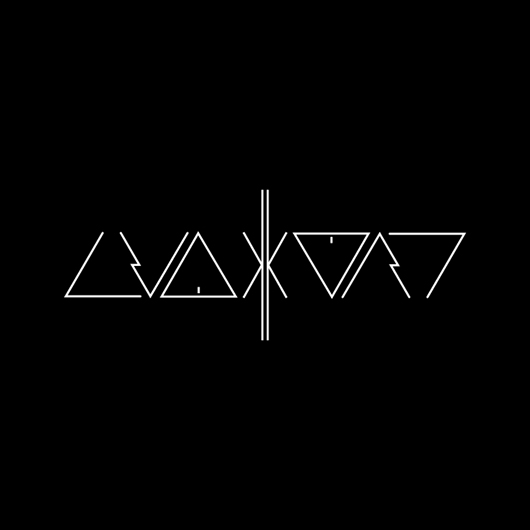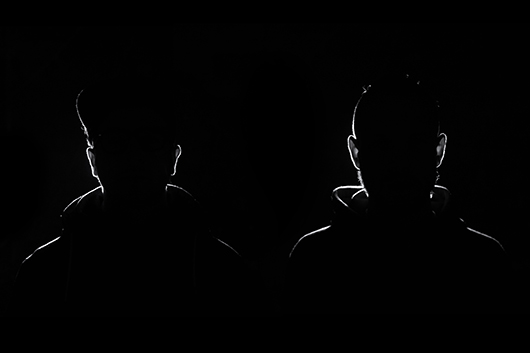Lifting the Lid – UK Duo Akkord Peels Back the Layers of Mystery Surrounding Its Music and Identity
Electronic music undoubtedly has more than its fair share of enigmas. Within the sphere of […]

Lifting the Lid – UK Duo Akkord Peels Back the Layers of Mystery Surrounding Its Music and Identity
Electronic music undoubtedly has more than its fair share of enigmas. Within the sphere of […]

Electronic music undoubtedly has more than its fair share of enigmas. Within the sphere of underground dance music, anonymity has become a cliché to the extent that, more often than not, the facadé of mystery is even less exciting than the unremarkable reality it usually shrouds. What sets British electronic outfit Akkord apart from this morass of faceless musicians, however, is that as the veil of anonymity has been slowly peeled away, the process has, at times, seemed to pose more questions than it’s answered.
Even before the information was officially revealed, educated guesswork across the internet identified Manchester-based producers Liam Blackburn (a.k.a Indigo) and Joe McBride (a.k.a Synkro) as Akkord’s key players, but rumours persisted of shadowy additional players lurking in the background. (An official promo shot, for example, sees the band represented by three blacked-out figures, rather than two.) Similarly, the manner in which the band’s music has been slowly drip-fed into circulation has felt equally cryptic. The first two Akkord EPs arrived in the form of super-limited, eponymous white labels and even after signing a deal with Fabric’s new offshoot label Houndstooth, the band has continued to find creative ways to premiere new material—flyer packs, phone hotlines, and cassettes have all been employed to tease the duo’s debut album. Add to that the fact that the limited amount of interviews Akkord has given to date have been littered with vague talk of lofty concepts like sacred geometry and the golden ratio, and the sense of mystique around the outfit quickly mounts up.
Of course, all this clever image management would mean nothing if the music itself wasn’t worthy of attention. Fortunately, with its combination of pinpoint-precise drums, haunting atmospheric lines, and clean, powerful bass tones, Akkord’s sonic palette packs enough complexity and intrigue to equal the pair’s image. The outfit’s first white-label EP, released roughly 18 months ago, grabbed listeners’ attention with its sleek blend of minimalistic techno rhythms and subtle garage inflections. In the intervening months—via a second white label, a handful of live shows and mixes, and Navigate, the duo’s debut EP for Houndstooth—a more expansive picture of Akkord’s aesthetic has formed, one which touches upon the vintage UK sounds of grime, garage, and early dubstep, all filtered through the group’s meticulously detailed and decidedly futuristic production style.
Akkord

At the end of this trail of breadcrumbs is Akkord’s eponymous debut album, which sees the group fully revealing itself, both in a literal, biographical sense—the sleevenotes reveal the names of those mythical satellite members—and sonically, offering, across its 10-track duration, the fullest exploration of Akkord’s sound yet. But while the cloak of mystery may have been lifted from around the group, speaking to Blackburn and McBride only reveals that there are still a number of fascinating contradictions at play behind the project.
The most fundamental discrepancy between Akkord’s public-facing image and its inner workings lies in the fact that, despite maintaining a face of measured precision and meticulous forethought, Akkord’s existence to date has been built largely around unplanned spontaneity. “When we signed the deal with Fabric, we didn’t have an EP or an album,” Blackburn recalls. “We went home that day and spent three days just making loads of tunes, and that’s where the Navigate EP came from. As soon as that got released, we just started on the album. It was really quick, it’s just happened in a flash. It’s pretty mad.”
“Most of the album we made in a two-week period of really solid getting on it for seven hours a day or something,” McBride adds. “That way it was more natural, rather than spending years trying to find a perfect sound.”
As it turns out, it was this lack of a concrete game plan that led to the duo’s decision to remain unnamed at the time of the earliest releases. “The whole anonymous thing wasn’t a long-term thing,” Blackburn explains. “We just didn’t want anyone to associate the sound or the image with anything we’d done previously. That was the purpose of it; it was just an in-the-moment kind of thing.”
“We didn’t really know what we were doing with the project at that time,” McBride continues. “It was just a bunch of tunes that definitely weren’t Synkro & Indigo tunes.”
The producers’ desire to draw a line between Akkord and their previous work makes sense; although this latest project is still in its relative infancy, Blackburn and McBride have been close friends for more than five years, and this is far from the first time they’ve collaborated. Separately, as Synkro and Indigo, the two artists have clocked up releases on labels such as Exit, Apollo, and R&S, including several collaborative works. They’ve also been jointly involved in running a label, Mindset, since 2008, and launched a second imprint, Electro Magnetic Fields, together earlier this year. Still, despite all of this shared history, Akkord is undoubtedly set apart from anything these two have done before. First and foremost, the key difference is the near absence of melody this time around. Although the producers’ solo efforts have touched on techno, drum & bass, dubstep, and ambient electronica, their releases have almost always felt awash with warmth and color. Akkord’s sound, on the other hand, is almost entirely driven by percussion and bass, with traditional lead elements stripped back to leave just the faintest suggestion of melodic progression.

As for the references to additional group members, they stem from Akkord’s desire to leave future plans for the project somewhat open-ended. The oblique promo shots and indirect references may conjure images of some kind of production illuminati pulling the strings from the shadows, but in reality, Blackburn and McBride simply don’t want to close off the project from the influence of casual collaborators. “The whole point of Akkord was loosely based around a collective,” Blackburn explains. “We wanted to keep it open for people to get involved.”
In the case of Akkord’s debut LP, this open invitation has resulted in the involvement of Manchester-based producer Biome (on “Rocendal”) and Bristol’s Troy Gunner (on “Folded Edge”). The pair is quick to affirm, however, that these tracks are still credited to Akkord, as opposed to Akkord and a featured artist. “It’s more like a collaboration for outputs that we do with other artists that might relate to the same sound that Akkord is doing,” McBride explains of the distinction. “There are no solid plans to work with certain artists. It’s just like, if it happens and it works, and it sounds like it should be Akkord, then it can go out as Akkord.”

Of course, exactly what Akkord sounds like can be hard to pin down. On the one hand, there’s an undoubtedly futuristic and forward thinking tone to the group’s debut album; the rhythmic patterns are, at times, almost inhumanly intricate, and there’s a crispness to the production that makes everything sound unmistakably contemporary. At the same time, there’s a distinctly nostalgic undertone to the record. On first listen, the LP invites comparison to the sonic innovators of mid-’00s dubstep—the tribal percussion is reminiscent of Skull Disco-era Shackleton, while the mood-shifting basslines and imposing atmospherics bring to mind Vex’d, Emptyset, and early Kode 9. In a way, the album almost feels like something of a statement, as it’s picking up the loose ends of a genre that much of the UK has abandoned in its mass exodus into house and techno.
“Everyone seems to have neglected the UK,” Blackburn acknowledges. “The UK sound has become an amalgamation of loads of other things. House and techno—yeah, it’s good, but the broken-beat sound is very British. Early hardcore, grime, and jungle, that’s what we’re into and that’s the shit we’re going for. But we’re trying to fuse it together with this more modern sound: the more clinical, bass-heavy sound. There are no plans, we’re just doing it and this is how it’s turning out.”
This affection for the UK hardcore continuum also appears to be present in the group’s desire to seek out creative ways of unveiling its music. The hand-stamped white labels, mysterious phone lines, and cassette releases all seem to harken back to pre-internet days, when dance music undoubtedly required more of an investment of time and energy from the listener. “We just didn’t really want to shove it down people’s throats,” McBride explains. “If you’re interested in the music, then you’ll go and find out about it. We’re kind of like that with the music we listen to and the music we buy.”
“It’s to make it fun for us as much as anything though,” he continues. “We like doing limited releases; we enjoyed hand stamping the first bunch of tunes we put out as Akkord. It was like a journey for us too, just experimenting with putting out music. We learnt a lot from it and still are. We’re still trying to do new shit, stuff that we haven’t done before. We’ve just done the cassette thing, and again, that’s just from us wanting to do something that we’d never done before. It fits with what we’re doing and it makes it more enjoyable for us, and more enjoyable for people that follow us and buy the music.”
This sentiment of giving the listener something of substance to dig into carries through into the group’s conceptual ethos, too. The pair is quick to assert that it doesn’t want to force the influence of ideas like sacred geometry upon anyone, yet the duo is certainly happy to scatter a trail of clues throughout its work.
“There are links there if you look at the album,” McBride explains, “although we’re not trying to shove it down people’s throats. For example, track six on the album is called ‘Hex_ad,’ which is the Greek for six, but also, the track itself is a mixture between 3/4 and 6/8 timings. If you listen to the rhythms within it, there are some pretty technical polyrhythms and stuff. It’s just stuff that we’re interested in.”

It’s not too hard to imagine how a fascination with such ideas influences Akkord’s music. After all, it doesn’t take a huge leap to get from the emphasis on minimalist beats and precise arrangements in the pair’s productions to the concepts of mathematical purity that the duo describes. While it might seem almost pretentious at first, the idea of tapping into ancient, pre-religious concepts has clearly proven to be an effective source of inspiration for the project. Blackburn, in particular, speaks enthusiastically and at length about the benefits of allowing such symbolic ideas to guide his music-making, and expresses hope that listeners might connect with the concepts through Akkord.
“It’s just nice to share it with everyone else,” he explains. “It’s really fascinating stuff. Some people will just see it as hippy bollocks, but in a way, that’s kind of ignorant. It is in a way, but it depends which angle you look at it from. If you go back into ancient cultures and research the Flower Of Life, for example, you’re going to find a lot of knowledge that’s very, intriguing. If you’re a designer or an artist or a musician, geometry in itself is a very good tool to use. It just works; it’s nature’s laws, if you know what I mean. You can tap into people’s psyche or consciousness with it, just by using it.”


